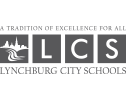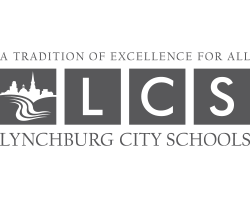At Lynchburg City Schools (LCS), the safety and well-being of students and staff members is our top priority. Over the past few years, we’ve updated our safety procedures in order to proactively foster secure learning environments at all of our schools, which range from a new School Security Officer (SSO) program to improvements to make our facilities more secure.
“Safety is not one single intervention, but rather a holistic approach requiring the combined efforts of everyone in the division, from security staff to instructional staff to families,” said LCS Deputy Superintendent of Operations and Strategic Planning Reid Wodicka. “Safety is integrated into every aspect of our work at LCS. Because of the measures we take to ensure our learning environments are safe, our schools can focus on instruction.”
Emergency Response Protocols and Crisis Communication
In August, every school received an in-depth training on reunification, a controlled release process designed to reunite students with their families after they’ve relocated to an alternate location due to weather conditions, power outages, hazardous materials, or crises at the school. LCS follows the Standard Reunification Method (SRM), a well-established protocol designed to make the process smoother and more predictable for all involved.
“The reunification training sessions the division held in August were extremely organized and detailed,” said R. S. Payne Elementary School principal Lori McVicar. “It was very meaningful to walk through and practice the process so all staff knew their roles and what to expect. I appreciated the thoughtful consideration of both student safety and the socioemotional needs of staff, students, and parents in stressful situations.”
McVicar’s sentiments are widely echoed amongst staff members who attended the training sessions. According to Wodicka, training staff in advance of emergency situations is a key component of the division’s crisis plans.
“School staff should know about division emergency response plans in advance, and they should feel included in the preparation process. It’s important for everyone to be aware of how the division is keeping school environments safe,” Wodicka said.
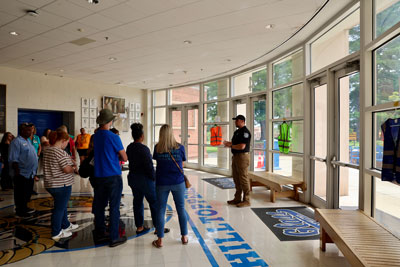
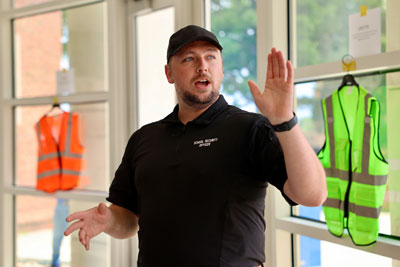
School Security Officer (SSO) Steven Sensabaugh trains staff members in the reunification process.
LCS works closely with local police, fire, emergency services, and health departments to develop and implement comprehensive safety plans, which include uniform emergency response protocols. The measures taken depend on the nature of the situation; in response to police activity in the area, for example, the school may lock its doors and disallow people from entering or exiting the building in accordance with restricted entry and exit protocol. In case of a more active threat, such as an intruder in the building, a school might go into lockdown, securing all students, staff, and visitors away from immediate danger. See overviews of LCS emergency response protocols here.
Another component of the division’s emergency response process is communication with parents, guardians, students, and staff members at affected schools. Communication is primarily conducted through mass phone calls, emails, and text messages, which include initial notifications about the nature of the situation as well as periodic updates and follow-ups as the situation progresses and eventually resolves.
“Our crisis communication has transformed in recent years. The structured protocols we’ve adopted have enabled us to provide clearer communication to families, students, and staff members during crisis situations,” Wodicka said.
Additionally, LCS uses the Raptor Emergency Management platform to help prepare for, respond to, and recover from emergencies. The platform expedites and streamlines emergency response by allowing staff members to initiate an alert directly through 911 and provide critical information to first responders, law enforcement, and school personnel.
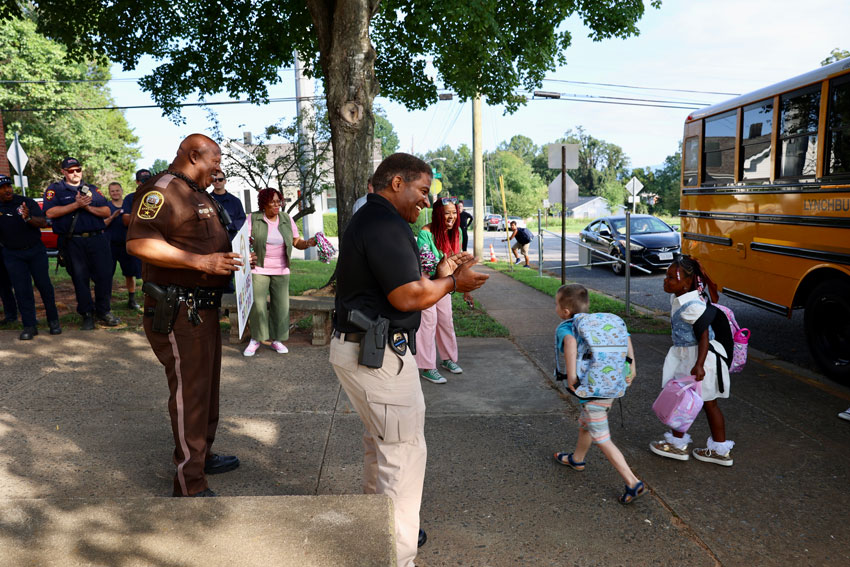
Strong partnerships with the police department, fire department, and sheriff’s office help keep LCS safe.
Proactive Measures
Safety procedures aren’t limited to emergency response protocols. Part of the division’s approach involves proactive measures to identify and address concerns before they arise.
One such proactive measure is the threat assessment process, mandated by the Virginia State Code. The threat assessment team is made up of experts in counseling, instruction, administration, and law enforcement and is dedicated to evaluating situations and implementing effective strategies to manage them.
When a potential threat against a school, student, or staff member occurs, the team works together to investigate and determine next steps, which often include mentoring, counseling, support, and setting appropriate boundaries. In rare cases, more serious actions may be necessary, but the primary focus of threat assessment is on prevention and support.
“The threat assessment process makes students, staff members and community members feel safer. We take every potential concern seriously and implement a multi-step process to determine what must be done to address it,” said Shannon Long, the lead school social worker at LCS.
One way concerns can be brought to the attention of LCS staff is through the SpeakUp for Safety tip line, which provides a simple way for students to easily and confidentially report threats of violence, bullying, peers in crisis, and other imminent threats. The tip line is monitored 24 hours a day, seven days a week, 365 days a year by trained safety representatives, who contact LCS staff with concerns.
In addition, LCS uses the Gaggle safety management solution for Google to protect students in fifth grade through high school and ensure that they are safely and correctly using school-provided digital tools. The system reviews the students’ Google files for inappropriate images and/or content identified by keywords that might signal concern. Gaggle representatives review Google files 24/7 and send alerts to schools and the school division for investigation and response as necessary.
Promoting Mental Health in Our Schools
Even before potential concerns arise, LCS staff are trained to be sensitive to students’ mental health needs. Ensuring student well-being through mental health support is a part of the division’s work to promote holistic student well-being.
“Safety and mental health are intertwined. Mental health challenges make it harder for students to learn at school and interact with others in safe and meaningful ways. There are safety risks associated with some mental health conditions, including higher rates of suicide,” said LCS social worker Karen Carlson. “We want to be aware of and responsive to mental health needs as they come, which is why we’re committed to implementing robust training and support systems for both students and staff.”
Every staff member in the division receives training in Youth Mental Health First Aid (YMHFA), which equips them to identify student mental health challenges and provide support. School psychologists, social workers, and counselors are committed to promoting student mental health in our schools, and with the help of a robust network of trained staff members, they’re able to be even more effective.
“LCS is committed to being proactive and supportive in recognizing and addressing student mental health needs. By training every single staff member in YMHFA, we’re opening up conversations in our schools and communities about mental health,” Carlson said.
When mental health crisis situations do arise, LCS staff are ready to address them. LCS mental health professionals conduct self-harm risk assessments and respond accordingly when concerns about student self-harm arise. After crisis situations like lockdowns, Carlson and her team often offer counseling services to students and staff members at affected schools to help them process the emotions that can follow a potentially traumatic experience.
Additionally, the LCS Restore program empowers students to succeed academically and emotionally through restorative practices. Guided by healthy relationship-building between educators and students, the program aims to help students change harmful behavior and build lifelong skills. Students receiving restorative support through the Restorative Suspension Center, Restorative Academies, or counseling at their base schools learn healthy conflict resolution techniques that can both improve mental health outcomes and prevent potential safety concerns.
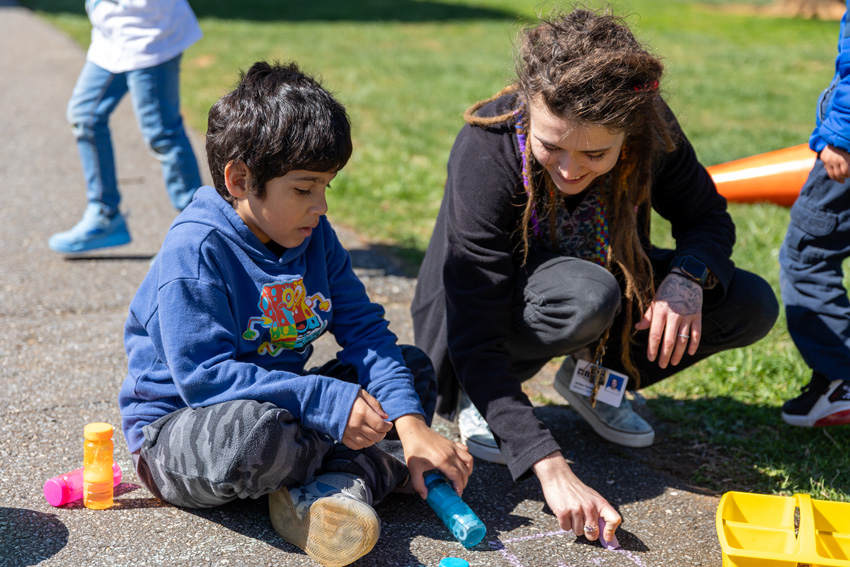
Programs like the Elementary Restorative Academy at T. C. Miller Elementary School help improve student mental health and promote success.
School Security Personnel
Since its launch during the 2023-24 school year, the School Security Officer (SSO) program has cultivated safe learning environments for students, staff, and guests at all LCS elementary schools. LCS Coordinator of School Safety and Security Nick Caputo oversees five SSOs, all of whom are former law enforcement officers whose extensive field experience and school-specific training equip them to protect staff and students and enforce school policies.
The program began with just three officers, including Caputo. Since then, it’s doubled in size, and each of the SSOs have been embraced by the schools they serve.
“Having a highly trained officer to continuously monitor our campus and immediately respond to potential threats helps us all feel safe so we can focus on teaching and learning,” said Bedford Hills Elementary School principal Sherri Steele.
The Virginia Department of Criminal Justice Services (DCJS) requires all Virginia SSOs to undergo a rigorous state certification program and receive training through local law enforcement agencies. At LCS, SSOs receive training that far exceeds the minimum requirements. They’re equipped to protect students, staff, and visitors in crises; mediate conflicts; assess potential threats; administer first aid; protect students with disabilities; keep students with mental health challenges safe; and more.
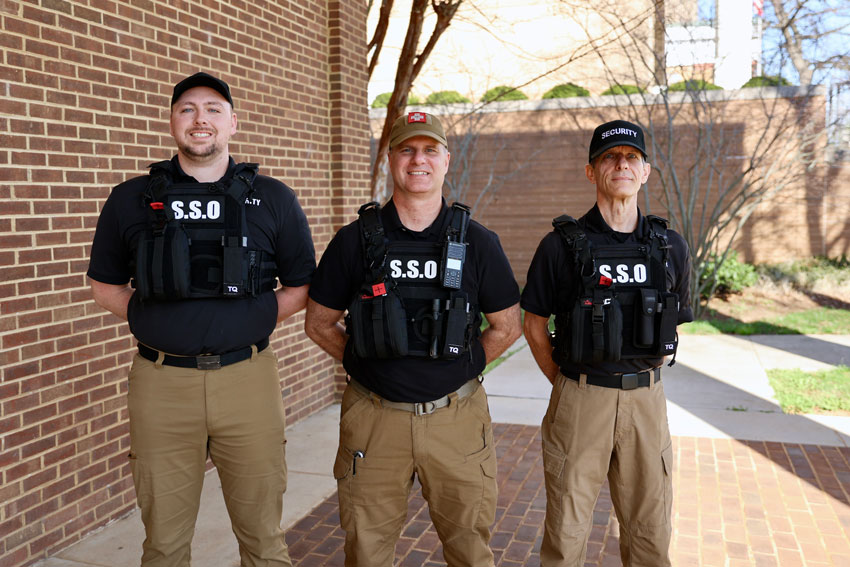
SSOs Steven Sensabaugh, Nick Caputo, and Jim Scott (left to right).
Each LCS secondary school also has a School Resource Officer (SRO), or a law enforcement officer employed by the Lynchburg Police Department (LPD) and assigned to a school. SSOs and SROs work together to keep schools across the division safe.
“Our relationship with the Lynchburg Police Department has deepened as a result of the SSO program. They come to me with issues and questions, and I’m happy to bridge the gap between educators and law enforcement. Our partnership helps us prioritize our educational goals and student safety simultaneously,” Caputo said.
From preparing crisis plans to safeguarding students, staff, and guests, SROs provide safety and security services while working full-time in the schools they serve. Like SSOs, they are trusted and beloved fixtures in their school communities.
“As an SRO, I assume the role of protector in these students’ lives. I’ve known many students and their families for years, and I can be a role model and mentor to them, as well,” said E. C. Glass High School SRO Robert Sacks. “Kids know they can be themselves around me and talk to me about anything. Getting to know students and building trust with them is the most rewarding part of my job. I genuinely love the students. There’s not one kid at E. C. Glass I wouldn’t lay down my life for.”
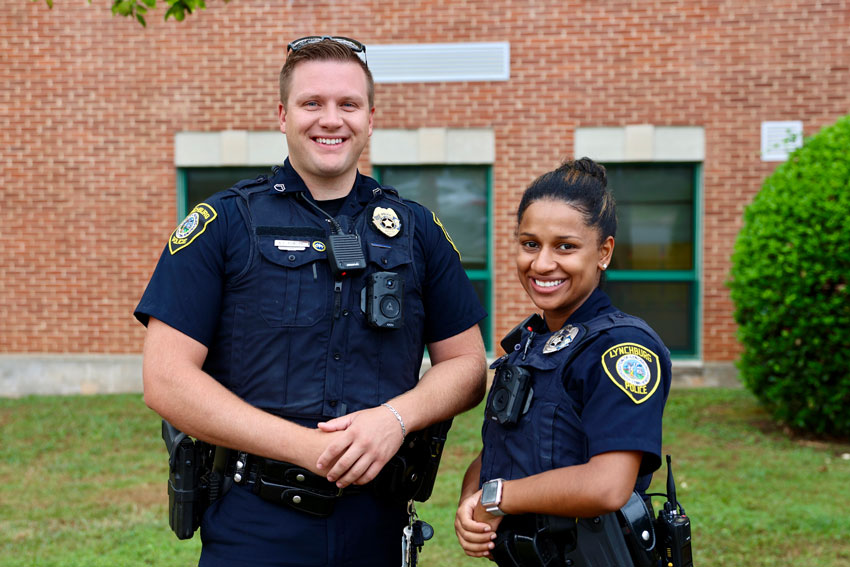
School Resource Officers (SROs) like Austin Rowland at Dunbar Middle School (left) and Liary Gauthier at Heritage High School (right) help keep schools across the division safe.
Building for Safety
Another important element of safety at LCS is the physical security of the buildings. As of this school year, every school building in the division has a security vestibule built into the front entrance that prevents unauthorized visitors from entering the building. A vestibule is an enclosed space between the outside door and the inside door, which remains locked unless staff members permit a visitor to enter.
At every school, glass doors and windows that can be accessed from the ground level are fortified by grant-funded security film, which holds glass together even when it is shattered. The film delays attempts to break through the glass, giving school security personnel extra time to respond to the threat.
In addition, LCS is currently in the process of implementing a division-wide access controls project. A unified lock-and-key system will be used at all schools, replacing the locks currently in use, and a highly standardized system will control who can access keys to LCS buildings and classrooms.
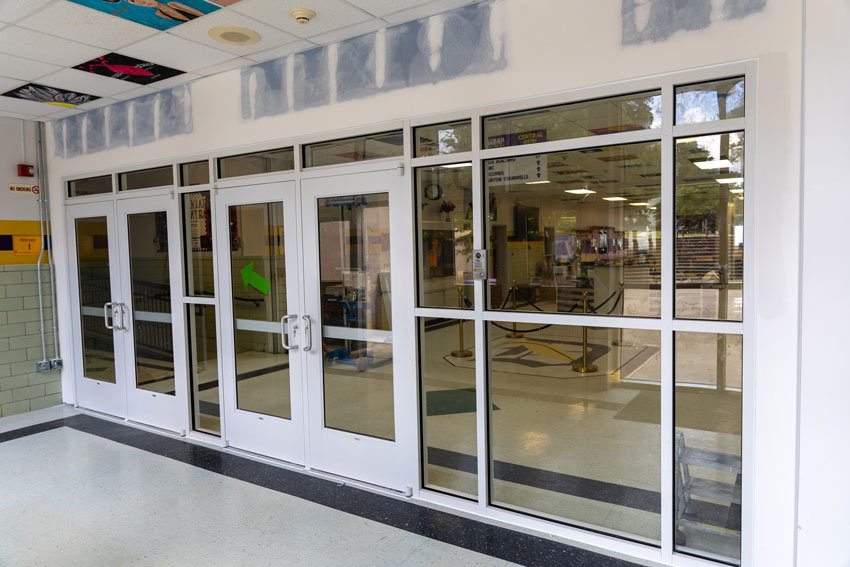
Dunbar Middle School’s security vestibule at the main entrance during construction this summer.
Protecting the Educational Experience
Emergency response protocols, crisis communication, proactive measures, student mental health, school security personnel, and building security are all key components of the division’s work to foster secure learning environments, which in turn helps promote successful outcomes for students.
“When our students graduate, we want them to look back on their school years and remember all the positive things they experienced, like the wonderful teachers they had, the football games they attended, and the musicals they acted in. All the safety work we do in the background helps ensure our schools can focus on teaching and fostering high-quality student experiences,” Wodicka said.
